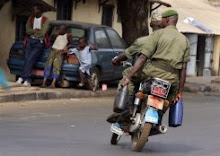Senegal's president, Abdoulaye Wade, whose country has sent troops in the past to restore security in its small, poor West African neighbour, is appealing for more international support for reforms to strengthen Guinea-Bissau's fragile democracy.
Early on Sunday, renegade soldiers attacked the Bissau home of President Joao Bernardo "Nino" Vieira with machine guns and rocket-propelled grenades, killing one guard and wounding another. But they failed to kill or overthrow the head of state.
Nevertheless, the assault highlighted the fragility of the former Portuguese colony a week after it held parliamentary elections donors had hoped would mark a break from a past of coups, mutinies and uprisings since independence in 1974.
No one claimed responsibility for the attack, but security forces are hunting for a marine sergeant, the nephew of one of Vieira's political rivals, former president Koumba Yala. Yala had rejected the results of the Nov. 16 elections as rigged.
At least five other soldiers have already been arrested.
Wade and regional security and anti-narcotics experts said the attack, while foiled by loyalist troops, underlined the need to move ahead quickly with internationally-backed reforms of Guinea-Bissau's military, both to reduce its bloated size and to boost its capacity to fight criminal drug-trafficking gangs.
"This is the key to stability and development ... investment and development cannot be held hostage by this kind of insecurity," Antonio Mazzitelli, head of the regional bureau of the U.N. Office on Drugs and Crime (UNODC), told Reuters.
In recent years, UNODC has focused world attention on the risk of Guinea-Bissau turning into a lawless "narco-state" as a result of Colombian cocaine-traffickers using its territory to smuggle tonnes of drugs from Latin America to Europe.
The cocaine barons have sought to set up storage and transit depots on the creeks and islands of what has been dubbed West Arica's "Coke Coast", using flotillas of planes, boats, vehicles and human "mules" to then transport the drugs on to Europe.
"The traffickers want their men in the government and the army, and so this country is too weak ... it's under attack from several sides," Senegal's Wade told Radio France International.
"RETIREMENT MEANS POVERTY"
On Friday, electoral officials announced that the former ruling African Party for the Independence of Guinea-Bissau and Cape Verde (PAIGC) had won 67 of 100 National Assembly seats in the Nov. 16 polls, praised by observers as calm and orderly.
Former President Yala, who rejected the election results and faces criminal charges for publicly accusing Vieira of involvement in drug-trafficking, heads the Social Renewal Party (PRS), which came second with 28 seats.
Yala is from the Balante ethnic group, which dominates the military, and civil society organisations have accused leading political figures and Balante military chiefs of using soldiers as personal militias, including to protect drug smuggling.
Senegal's Wade said Guinea-Bissau, with just 1.6 million inhabitants, was also still awash with weapons and combatants left over from a brief but bloody 1998/99 civil war.
These weapon stocks and the swollen, ill-disciplined military needed to be cut back, Wade said. "If the international community agrees, we can put in place an anti-drugs mechanism and help this country reduce its army," he added.
A Spanish army general is already leading a European Union mission to try to downsize and domesticate Guinea-Bissau's fractious military, the remnants of a once proud guerrilla army that liberated the nation from Portuguese rule in a bush war.
But since independence, the army has badly tarnished its own image with a series of bloody coups and mutinies, a civil war and a 2004 revolt that killed its commander.
A U.N.-funded census this year revealed an armed forces top-heavy with officers -- more than 3,000 out of a total 4,500 members -- and also ageing, with hundreds in their 60s.
Many of these old soldiers, some of them senior commanders, fiercely resist the idea of retiring from a profession that gives them a home and meal in a country prostrated by poverty.
"The soldiers don't want retirement, because retirement in Guinea-Bissau means poverty," one local journalist said.
UNODC's Mazzitelli said the planned security reform initiative included the proposal of a pension fund to provide a subsidy to those soldiers who would be laid off from the ranks.
Wade said Guinea-Bissau also had to be clear about what kind of security forces it needed, and about their mission.
"A country like that needs police forces ... it doesn't need an army equipped with rockets and who knows what. To make war on whom?" the Senegalese president said.
Senegalese troops had previously intervened in support of Vieira in the 1998/99 civil war which eventually overthrew him after nearly two decades in power. Rival Yala took over after winning a presidential election in early 2000 but was himself deposed in a coup three years later.
Source: Reuters

No comments:
Post a Comment